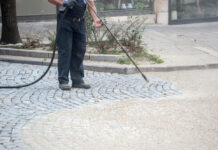Driveways endure a lot—from heavy vehicles to harsh weather—and over time, this wear and tear can take a toll on the surface. Sealing your driveway is a simple yet effective way to protect it and extend its lifespan. But many homeowners aren’t sure when to seal or why it’s even necessary. Here’s what you should know about this essential maintenance step.
Protection Against Weather Damage
Driveway sealing creates a protective barrier that shields the surface from water, UV rays, and temperature extremes. Without it, moisture can seep into cracks, freeze during colder months, and cause further deterioration. A sealed driveway resists these elements and stays looking newer, longer.
Preventing Cracks and Erosion
Unsealed driveways are more vulnerable to oil stains, chemical spills, and surface erosion. Sealant helps fill minor surface imperfections and prevents them from expanding into larger, more costly repairs. It also keeps the surface smoother and easier to clean.
Improving Curb Appeal
A freshly sealed driveway has a rich, dark finish that instantly enhances your home’s curb appeal. It gives the appearance of a well-maintained property and can make a strong impression on guests or potential buyers.
When to Seal
For asphalt driveways, sealing should typically be done every 2–3 years. New driveways should cure for at least six months before sealing. Timing also matters—spring through early fall offers the best temperatures for sealant application and curing.
Sealing your driveway isn’t just about looks—it’s about protection, performance, and long-term savings. Done at the right time and on the right schedule, sealing guards against weather, wear, and costly repairs while keeping your home’s exterior sharp. If you want to preserve your driveway and avoid bigger headaches down the road, sealing is a small step with big benefits.



